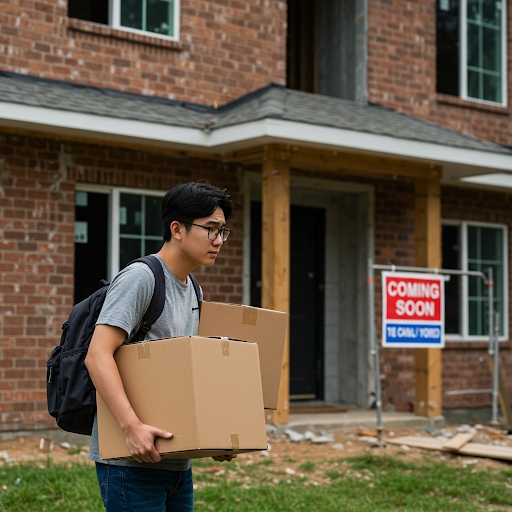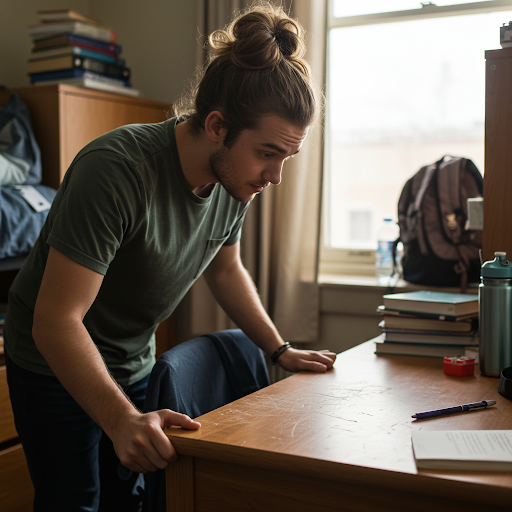Moving abroad is an exciting experience, especially as a university student, but it is also challenging. Finding a rental is one of the most defining and difficult parts of this process. While the situation is improving and scammers are increasingly being filtered out, similarly to most major cities, you can still encounter typical tricks in Budapest that can cause many headaches and significantly ruin your experience of studying in Budapest.
When searching for a rental, it is important to be prepared for the typical tricks and pitfalls. Based on the experiences of our former students and ours, we have collected the most common red flags of apartment hunting. We listed 14 tips a student should bear in mind during a rental search. These are the following:
- The Rent is Too Low Compared to the Average Prices
- The Landlord Refuses to Meet in Person
- Sign Only a Detailed, Comprehensive Contract
- Two Contracts for One Apartment: Rental Agreement and Accommodation Service Agreement
- Only Rent a Fully Completed Apartment
- Verify the Property Ownership
- Check the Actual Condition of the Furniture
- Check If the Apartment Has Heating and Its Condition
- Check for Prepaid Meters in the Apartment
- Utilities Should Be Put in Your Name
- Make Sure the Rent Includes the Common Costs
- The Internet That Only Exists on Paper
- Keys and Privacy
- Being Asked to Take Care of the Landlord’s Pets? Don’t Give In!
These will help you approach your apartment hunt safely and with peace of mind!
If you want to save yourself the hassle and book a room at us – a reliable service provider – then feel free to contact us!
1. The Rent is Too Low Compared to the Average Prices
Avoid rentals with prices that seem too good to be true! If a rental is too cheap, there’s almost certainly some trick involved. Compare the rental price with other (similar) rentals, and ask yourself: how much does it deviate from the average?
Here are some average Budapest rental prices for comparison:
- Room: €300–450/month + utilities ($310-410)
- Studio apartment: €470–650/month + utilities ($485-670)
- One-bedroom apartment: €580–750/month + utilities ($600-775)
- Two-bedroom apartment: €750–1100/month + utilities ($775-1130)
2. The Landlord Refuses to Meet in Person
If the landlord is unwilling to video chat with you or meet in person, it’s a huge red flag! If you encounter this, walk away, as it’s almost certain there’s more going on behind the scenes.
Pro tip: it’s worth searching the landlord’s name in popular rental groups (e.g., on Facebook) to see if there are any positive or negative reviews about them.
3. Sign Only a Detailed, Comprehensive Contract
The rental agreement should cover all key points related to the rental and potential disputes. These are crucial as the points of a contract determine the future options of a tenant student if s/he is dissatisfied with the rental.
The contract must always be in written form! Ensure the following points are included in the agreement:
- Exact condition of the apartment: include an inventory of the technical equipment and furniture in the apartment alongside the contract. Check these together with the landlord when moving in. It’s even better if this is documented with photos.
- Determining wear and tear: take photos of the apartment’s interior when moving in and again when moving out. The contract should specify how the cost of any damages will be determined.
- State and functionality of technical systems: clarify who will cover repair costs for issues like pipe bursts or heating maintenance. (typically, these are the landlord’s responsibility)
- Who pays for utilities?: if tenants pay a flat rate for utilities, clarify how and when settlements are made with the landlord.
- What happens in case of contract termination?: there are specific laws regarding the termination of rental agreements that landlords must adhere to. For example, if the landlord unlawfully terminates the contract early, they may need to provide alternative housing options.
- Number of occupants in the apartment: the contract should clearly state how many people, besides the tenant, are allowed to live in the apartment.
- English and Hungarian contracts: in Hungary, landlords are not required to provide a contract in English for foreign tenants. If your rental agreement isn’t bilingual, ask a Hungarian-speaking friend to review it for you. This ensures you understand your rights and obligations and that everything is in order.
Additionally, include in the contract who will bear the costs of the notarized deed (in Hungarian: közjegyzői okirat). In Hungary, if you want to rent a property, the landlord may require you to sign a notarized deed.
A notarized deed is an official document that protects the landlord against a non-compliant tenant. It allows for direct enforcement against tenants who fail to pay rent or refuse to vacate the property. The cost of this deed is usually split 50-50% between the landlord and tenant, though in some cases, the landlord covers the full cost.
Always insist on a written agreement. Verbal agreements are not legally valid in Hungary. Whatever you agree on with the landlord, ensure there is written documentation or proof!

4. Two Contracts for One Apartment: Rental Agreement and Accommodation Service Agreement
Some landlords use a tricky method by having you sign two separate agreements: a rental agreement (lakásbérleti szerződés in Hungarian) and an “accommodation service” agreement (szálláshely szolgáltatási szerződés in Hungarian). This setup allows them to evict you from the apartment more easily if necessary.
Tip: Always ask the landlord about the type of contract and avoid signing agreements of different types!
At Diáklakás, we use only one type of contract: a rental agreement.
5. Only Rent a Fully Completed Apartment
It may seem obvious, but it’s not. In Budapest, it’s not uncommon for landlords to rent out apartments that are still under construction. You might sign the rental agreement only to find out later that the apartment isn’t finished or is under renovation, preventing you from moving in for months.
Only rent an apartment that is fully completed and ready for immediate move-in!

6. Verify the Property Ownership
Before signing the rental agreement, ensure that the landlord listed in the contract is legitimately authorized to rent out the apartment. Request the property ownership document (tulajdoni lap in Hungarian) and verify that the owner’s name matches the name on the rental agreement!
7. Check the Actual Condition of the Furniture
Not everything about the apartment’s furniture is as it seems. The advertisement might show modern, stylish furniture, but upon moving in, you may find a cheap bed, a worn-out wardrobe, and a creaky table.
Tip: The best option is to ask the landlord to show you the furniture in person. At the very least, request updated photos of the items!
At Diáklakás, you have the option to view the rooms and furniture via online video chat if you can’t visit the rooms in Budapest in person. If you’d like to make sure the room and furniture are in the same condition as in the photos, just contact us, and we’ll show you!

8. Check If the Apartment Has Heating and Its Condition
It’s easy to rent out an apartment during the summer, but once the cold weather arrives, you may find that the heating system doesn’t work properly or is very expensive to operate.
Before moving in, ask the landlord if there are any issues with the heating and what type of heating system the apartment uses.
9. Check for Prepaid Meters in the Apartment
Some rental properties have prepaid meters installed for electricity or gas regulation, but tenants are often not informed about this before moving in. These meters can easily shut off if you don’t pay in advance.
Tip: Always ask if the apartment has such prepaid meters!
At Diáklakás apartments, there are no prepaid meters like these.
10. Utilities Should Be Put in Your Name
Some landlords don’t transfer the utility accounts into the tenant’s name, and at the end of the rental period, they bill you based on “estimates.” This allows them to overcharge.
Tip: Insist on having the utilities transferred into your name so you can pay directly to the service providers.
At Diáklakás all utilities are paid by us, the owners, and their cost is already included in the rent.
11. Make Sure the Rent Includes the Common Costs
It often happens that you see an attractive price in the ad, but upon signing the lease, you discover that the common costs are not included. In Budapest, these costs can amount to tens of thousands of forints, which must be paid in addition to the rent.
The common cost is the fee that all residents of a building pay to the building’s management, covering maintenance and cleaning.
Tip: Always ask if the rent includes the common costs.
At Diáklakás everything is included in the rent, including the common costs and internet.
12. The Internet That Only Exists on Paper
It often happens that the ad states the rental includes internet, but when you move in, you find out it’s either not installed or incredibly slow.
Always ask the landlord in advance if there is active internet in the apartment and inquire about its speed. Pro tip: Ask the landlord to send you a screenshot of an internet speed test!
At Diáklakás there is a powerful 2000 Mbit incoming internet connection, distributed to individual rooms via a dedicated network server.

13. Keys and Privacy
You should receive all the keys to the apartment. Some landlords keep one key for themselves and occasionally enter the apartment without prior notice. This is not only unpleasant but also illegal.
Tip: Make sure you have all the keys, and that the landlord is only allowed to enter the apartment with a prior agreement.
14. Being Asked to Take Care of the Landlord’s Pets? Don’t Give In!
Some landlords might ask you to occasionally take care of their pets or leave a cat in the apartment for you to look after. The problem is that this is often not mentioned in advance.
Having a pet in the rental might sound like a cute extra, but it places a significant responsibility on the tenant. As a student, you likely won’t have the time to manage this alongside exams, parties, and exploring Budapest or Hungary.
Tip: Make sure to include in the rental agreement that no such “extra” responsibilities are expected from you.
Which Districts Are Best for Students Renting in Budapest?
For international students, the following districts are ideal for renting in Budapest:
- District V: the heart of Budapest, where most universities are located nearby.
- Districts VI and VII: close to the city center, with excellent public transportation and vibrant nightlife & cultural life.
- District VIII: a rehabilitated part of Budapest. While there are still a few less desirable areas, most of the district is safe and one of the coolest options for students.
- District IX: a district with a similar history to District VIII, but now a completely safe and affordable, albeit slightly pricier, area with a great local vibe.
- District XIII: though slightly farther from the city center, the M3 metro line runs through the district, allowing quick access to almost anywhere.
Pro Tip: some districts have both good and less safe areas. As a general rule of thumb, the closer a district’s part is to the city center and the Danube, the safer (and more expensive) the rentals tend to be.
Final Thoughts
Finding the right rental isn’t an easy process, and a poorly chosen apartment can greatly diminish an unforgettable experience abroad. However, if you follow these tips, you’ll be able to find a suitable apartment and a reliable landlord without any issues.
Always stay cautious, never hesitate to ask questions, and don’t be afraid to say no if something seems suspicious!



